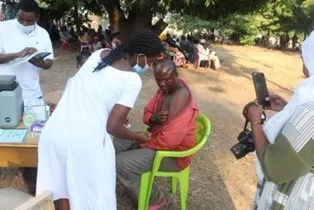
Since September 2021, CARE Tanzania has worked as a partner to the Government of Tanzania to improve vaccine access across the country. CARE’s logistical support has helped the government to cover large, underserved geographical areas. To increase vaccine uptake, CARE staff has also engaged local Community Health Workers (CHWs) to address vaccination misconceptions and developed improved health communication and data management tools. With these new resources, these health workers on the front lines have put in place two new strategies. First, COVID-19 vaccination is now integrated with other basic health services at local facilities. Second, the CHWs are now conducting targeted outreach informed by local concerns to address vaccine hesitancy in women and children. Now, not only are vaccinations being provided, CHWs have confirmed that women have increased their acceptance of vaccination shots.
“Her Money. Her Future.” showcases CARE’s accomplishments in advancing economic justice for women worldwide, including a pioneering financial return on investment (ROI) metric. CARE's savings groups generated $9 in women’s income for every $1 invested. Read More
Across the CARE federation, advancing health remains a key impact area strategy. Aligned with the 2030 Sustainable Development Goals, this Right to Health Strategy is an update on the 2020 strategy. The four interrelated areas of focus contribute to building resilient, equitable, and accountable health systems. Read More
A bipartisan delegation of six U.S. Congressional Representatives and staff traveled to Kenya with CARE to learn about how U.S. foreign investments are enabling communities to thrive and find durable solutions to hunger and malnutrition in the region, even as they experience economic hardship, conflict, and humanitarian crises. Read More